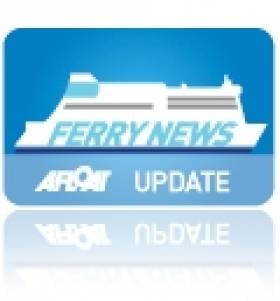Displaying items by tag: Finland
Ulysses Celebrates 10 Years of Irish Sea Service
In January 2000 the keel of the worlds largest car ferry was laid at the Aker Finnyards in Rauma, Finland. The following year the €100m cruiseferry giant departed the shipyard on a four-day delivery voyage to Dublin Port. Upon Ulysses's arrival on 4th March she was presented with a traditional welcoming escort of saluting water-firing tugs.
The Ulysses was named at a ceremony in the port on 21st March by the 'golden godmother' Mairead Berry, Ireland's 25-year old Paralympic Games gold medallist. Four days later Ulysses made her commercial maiden voyage to Holyhead on 25th March.
Wih 12 decks the vessel has an extensive range of facilities and they are named with themes derived from James Joyce's famous novel 'Ulysses'. There is seating available for up to 1,938 passengers and there are 117 twin or single-cabins, accommodating up to 228 passengers.
Only two months into service the Ulysses won the prestigious 'Most Significant New Build - Ferry' category award in the Cruise & Ferry magazine 2001 Awards competition. Her Finnish builders are not only builders of large cruise-ferries for Baltic Sea operators and beyond but also are also renowned for the construction of very large cruiseships for international clients.
Ulysses was designed specifically to serve the central corridor route with a schedule of two round trips daily. She directly replaced the 1997 Dutch built 34,031 grt ro-pax Isle of Inishmore, which transferred to Rosslare-Pembroke Dock service.
In 2006 the Ulysses alongside her fleetmates were transferred from the Irish flag to the Cypriot flag in addition to a change of Irish crew with those outsourced from citizens mostly from the Baltic and Eastern European countries.
Due to the sheer size of the Ulysses, which has a length of 209m, a beam of nearly 32m and a 6.4m draught, she has not missed a single crossing due to bad weather conditions. The vessel has a 22 knot / 41kph service -speed on the 60-mile route which translates to a distance of over 182,000 kms a year.
To celebrate Ulysses 10th year in service, Irish Ferries has enhanced the Club Class option to passengers which includes free-Wifi, which enables a constant connection and an array of other benefits during the 3-hour 15 minute crossing.
For a virtual tour of the Ulysses with views taken from the top deck as the cruiseferry departs Holyhead and the mountains of Snowdonia setting as a backdrop plus interior tours of the vessel click here.
























































